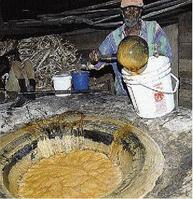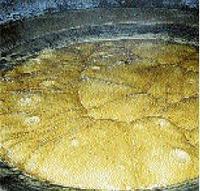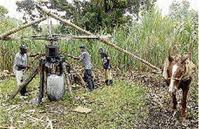Say the words 'wet sugar' to today's youth and many of them would probably respond, 'wet what?" Or, you would probably be castigated for being a pervert!
Say the sane words to older Jamaicans and more likely than not you will be rewarded with a smile. Because they remember fully well the days when wet sugar was the main ingredient in their favourite beverage - lemonade. They remember it being a staple for their parents, their grandparents and generations going way back.

(From left) Berty Brown, Mark Lewis, Fitzroy Gayle and Leonard Forrester watch as the cane juice is boiled and becomes wet sugar.
- Photos by Ian Allen/Staff Photographer
Twenty-first century Jamaicans are familiar with granulated (white) sugar, and those who have become conscious of health and longevity, or whose choice of sugar is influenced by the state of their finances, have embraced brown sugar.
But the making and use of wet sugar, one of the traditions practised in the early centuries, is still alive and well in Jamaica.
This tradition resides in the rural Westmoreland community called Lundie, which is situated close to Darliston, and several persons - mainly old-timers - involved in this production are proud to showcase their operation and the product - wet sugar.

Cane juice boiling will become wet sugar.
The Outlook team took the trek into the community and saw this operation which utilised manpower, horsepower (literally), copper pots and a boiling system that the men call 'chattanooga' which, they said, had been around since slavery, because the making of wet sugar is a heritage of our foreparents.
Great accomplishment
According to Berty Brown, to cut the cane, feed it through a mill which is attached to a horse and watch the sugar cane be ground into liquid is an accomplishment for which he is proud. The liquid is then moved to a copper pot, he said, where it is boiled, all the waste extracted and the product that is left is indeed wet sugar.
"Swoofh," said Berty, "gwaan bwoy," he said to the horse that was drawing the mill.

After the boiling is completed, the sugar is put to cool in containers.
Meanwhile, 82-year-old Leonard Forrest stoked the fire that was made from wood and the waste from the cane.
He told Outlook how the wet sugar production became an enterprise for them.
"It was 25 years ago that I used to plant the cane to feed the animals but it (the yield) was more than the animals could use, then me decide to use it (in the production) and ah so me start."
He said he watched his father in the earlier years producing wet sugar. It is an activity he now enjoys it's hard work. But the
rewards for his labour can be as sweet as the commodity he produces, because wet sugar carries a price of $400 per pound.
The production on the property was continuing. "Yu see how di liquor a cum out a de cane, a de real ting dat, nutten nuh add to it and dat's why it so good. Is like wi have de real gold dung ya man," said Leonard Forrest.
As the Outlook team watched the making of wet sugar, the sweet smell of food greeted us. By then Mark 'Rat' Lewis arrived with a large pot consisting of several chunks of yam, dumplings and stew chicken. It was amazing to see how the men of very small build dealt with the large amount of food that was served.

Juice the cane by the old method that has been practised since slavery.
When photographer Ian Allen asked, "Nutten nuh lef fi de dog dem?" Berty responded, "Wi nuh cook fi dog sah."
After a good laugh it was back to the lesson on cane, by which time the horse known as Star Boy had ground several gallons of cane juice. Fitzroy Gayle, a man in the community, joined the group.

Production is aided by manpower and horsepower.
The men said that despite the urban drift, the theft of their products and cattle, the wet sugar "sell like hot bread".
It was clear that all the activities around the small farm made the Westmoreland community proud of the real Jamaican country lifestyle.
Despite the fact that the work is hard, despite the fact that the men have lost their equipment to persons who do not know the value of the age-old metal pots, the men said that they will continue to produce wet sugar, much to the delight of all those who benefit from its returns.
It will no doubt be sweet memory that they will have to relate to their grand and great-grandchildren, of times when sugar was king in Jamaica.

